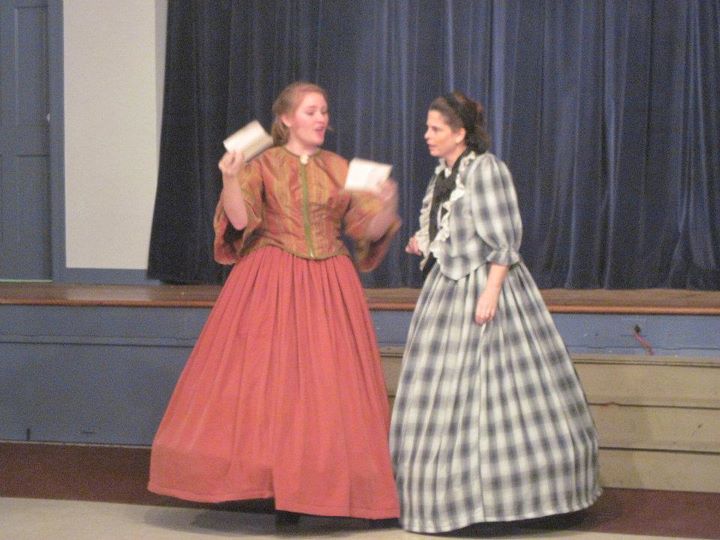The Dead Playwright’s Repertory opened its inaugural season on October 7 and runs through October 23, featuring the works of two dead playwrights–William Shakespeare’s, THE MERRY WIVES OF WINDSOR and Aristophanes’ LYSISTRATA. STAGE Magazine took time to interview Wendie Hetherington about the new theatre company and the plays that launched its season.
STAGE: Tell me about the Dead Playwright’s Repertory? How you got started?
DPR: I would say about 95% of the actors in our company have worked together before on numerous productions. We felt it was time to start our own company. We wanted to…
Shake up The Dead, Shake off The Dust and do more than just Shakespeare.
STAGE: What made you decide to focus on the “dead” playwrights? Tell me it isn’t just about copyrights and royalties.
DPR: LOL. No it isn’t. Most of our backgrounds come from classical theatre. We decided that there were numerous unknown and obscure plays and playwrights that had rarely or never been done who needed to be brought to the light of day.
STAGE: Why did you choose the name Dead Playwrights Repertory?
DPR: Well that’s actually a funny story. We were having what we call a beer and pie party, we were tossing around names, someone shouted out Dead Playwrights Repertory and we all loved it.
STAGE: Why did you pick THE MERRY WIVES OF WINDSOR? Is it because it is focused on middle class life?
DPR: Actually no, it’s because it was the only one of Shakespeare’s comedies our Artistic Director had not done yet.
STAGE: THE MERRY WIVES OF WINDSOR is one of Shakespeare’s earlier plays and there some controversy as to how it came to be written. Can you enlighten us? Is there a particular theory you think is more valid, or that you choose to accept and why?
DPR: The theory is that Shakespeare was commissioned by Queen Elizabeth I to write a play about “Falstaff in Love.” There is speculation that this is not true because it means he wrote it in between writing HENRY IV, Parts 1 and 2. Critics have trouble believing this because there are inconsistencies between them and THE MERRY WIVES OF WINDSOR such as no references to any of the major events going on at the time. We believe it is these inconsistences that prove Shakespeare had little time to write and have it performed.
STAGE: What makes THE MERRY WIVES OF WINDSOR a play we should want to see today? Are you trying to appeal to our bawdier side or do you think there is deeper reason we should see this play?
DPR: THE MERRY WIVES OF WINDSOR is just good old fashioned fun. The play has something for everyone, and who doesn’t love seeing someone get what they deserve.
STAGE: Let’s switch gears to Aristophanes’ LYSISTRATA. Some of the same basic questions though.
Why LYSISTRATA?
DPR: We wanted to another comedy as we had been doing a lot of tragedies in the past. We chose LYSISTRATA to go along with the “Battle of The Sexes” theme of THE MERRY WIVES OF WINDSOR.
STAGE: Do you find differences between the ancient Greeks of Aristophanes and Shakespeare’s Elizabethans?
DPR: Honestly not much. The common questions and concerns of the populace are pretty much the same as it is today.
STAGE: Key themes of THE MERRY WIVES OF WINDSOR include love and marriage, jealousy and revenge, social class and wealth. What the themes running through LYSISTRATA that we should be aware of? Are the themes in these two plays relatively the same—or would you characterize them as something else?
DPR: The main theme in LYSISTRATA is NO useless war. The main point of LYSISTRATA is why are you fighting amongst yourselves? The men are warring just to war. It is a valid point especially in today’s times. What is interesting is there have been many references to Lysistrata and her point lately in the news. This past July in a violence plagued area in the Philippines women from a sewing collective withheld sex from their husbands until they stopped fighting. It worked! Similar campaigns were carried out in Kenya in 2009 and in the Columbian city of Pereira in 2006. There was also The Lysistrata Project in 2003. That was thousands of staged readings of Lysistrata on March 3, 2003 to protest the Bush War in Iraq.
STAGE: Your actors and LYSISTRATA—What are their thoughts on playing the “dead playwrights”—especially Aristophanes?
DPR: Well, personally, I love playing Lysistrata. She is a bold, courageous woman who is still human. She comes up with a radical idea to end the war but underestimates the women’s need for sex as well. It is fun to play both sides of her, the in-charge, confident women then the one who is losing that control who has to get it back. My favorite part is where I match wits with the magistrate.
STAGE: What is it about the Dead Playwrights that we should embrace as theatre-goers?
DPR: Based upon Elizabethan staging of Shakespeare’s day; DPR’s minimalist staging is designed to stimulate the imagination using words and actions rather than elaborate backdrops, to set the scene. The ‘thrust’ staging offers an intimate setting that really puts the audience in the middle of the action as the action happens all around the theatre, rather than just in front of the audience.
So come enjoy life with the Dead, Dead Playwrights that is.
THE MERRY WIVES OF WINDSOR
By William Shakespeare
LYSISTRATA
By Aristophanes
For tickets, contact:
Carol Schwab
Dead Playwrights Repertory
609-221-2991
deadplaywrightsrep@gmail.com
http://Deadplaywrightsrepertory.org




